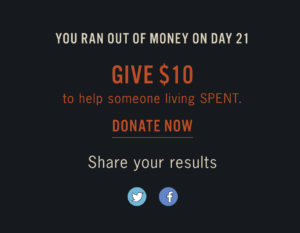Spent
Spent is a web-browser game developed by the advertising agency McKinney for the Urban Ministries of Durham (UMD) as a pro bono project. It is an interactive experience that seeks to educate players about the challenges and difficult choices faced by individuals living in poverty. At the end of the game, the player is encouraged to donate to those living Spent, whose financial difficulties are not a game but a reality.

Beginning decision for choosing a job
Kinds of Play
Spent is a combination between role-playing, experience-based play, and simulation-based play. Role-playing is immediate when the player imagines that they are an unemployed American. However, for players who aren’t actually unemployed, Spent provides them with a new experience where they are forced into difficult dilemmas where they must make choices that follow with likely unfortunate consequences. Since this game simulates real-world scenarios that real people in poverty face, Spent also falls under simulation-based play. It helps players understand how life works for those in poverty.
Mechanics
The player assumes the role of a person living on a limited budget of $1,000, and they must make a series of choices to survive for a month. The game presents various scenarios and decisions related to housing, employment, healthcare, and other essential needs. Every decision that the player leads to consequences that affect their financial situation.
Dynamics
Decision-making as a major element in Spent places the player in various moral dilemmas. For example, when I was proposed with the scenario of my child catching a fever, I had to choose between skipping work to stay home, sending my child to school sick, or leaving my child home alone. I chose to skip work and stay home with my sick child, but that resulted in a job strike for missing work which put my job at risk. As the game goes on, the player tries to make it through the month without running out of money while having to potentially make difficult choices that conflict with their personal values and principles.
Aesthetics
Spent requires players to imagine that they are one among 26 million unemployed Americans, encouraging fantasy through make-believe. Furthermore, as the player gets deeper into the game with every decision made, they are engulfed in narrative, as every decision leads to consequences that affect their limited budget as well as their fictional well-being.
Outcomes
In allowing players to walk in the shoes of someone in poverty, Spent aims to build empathy in players. It forces players to make difficult decisions and experience the stress and uncertainty that people in poverty face daily. The scenarios are based on real-life situations and was shared by a real-life organization, making it more relatable and easier for players to understand that it is difficult to escape poverty despite working long hours and being frugal. The curated prompts also seem to elicit emotional responses from players, encouraging them to reflect on the social and economic issues it addresses and to donate to those in need.

Ending screen prompts a call to action



